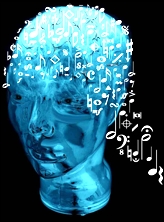Mission Statement
The Centre for Systematic Musicology at the University of Graz, Austria (SysMusGraz) promotes research and teaching in all areas of systematic musicology (SysMus). Whereas our focus is on music psychology, our research also involves physics, neuroscience, cognitive science, sociology, philosophy, and computer science of music, as well as other musicological subdisciplines (ethnolomusicology, historical musicology, jazz and popular music). Our work addresses for example:
- the perception of pitch, consonance and tonality in western music, with implications for music theory
- neurological foundations of musicality (aptitude and learning-induced plasticity), the development of musical abilities in children, and musical transfer effects to cognitive domains
- the psychology of musical interaction and creativity with a focus on embodied cognition, with implications for music education and development
- cross-cultural perspectives on music therapy and music medicine: healing, ritual, altered states
Deep interdisciplinarity. To shed light on such complex issues, we specialize in interdisciplinarity of the most difficult kind - that between epistemologically distant disciplines. Our researchers strive for a balance between and among humanities (e.g., anthropology, history, philosophy), sciences (psychology, physics, biology, computer science) and practically oriented disciplines (music performance, composition, therapy, education, medicine). We actively promote deep interdisciplinarity internationally through the Conference on Interdisciplinary Musicology (CIM) and the Journal of Interdisciplinary Music Studies (JIMS), both of which were created and are maintained by the centre.
Future orientation. We work for tomorrow. Our research has implications for the future not only of research in areas such as musical neurosciences, music cognition, and cognitive ethnomusicology, but also the future of related disciplines such as music education, music theory, and music therapy. More generally, and beyond music, our research addresses the future of intercultural interaction and the future of the global ecosphere.
Digitization. Digital methods are central to our research. We statistically analyze digital databases of historical musical scores to gain new insight into music theory and music cognition. We apply digitally founded neurological measures (EEG, brain imaging) to study the neurobiology of music cognition. We develop and implement globally accessible, low-carbon, semi-virtual conference formats that take advantage of emerging audiovisual communication technologies.
International visibility. Our research findings are mainly published in English in high-impact international peer-review journals. We continue to promote the German language in our interactions with media, students, and colleagues in research and administration.
Collegiality. We promote and enjoy a friendly, collegial working environment. Our common goal is academic quality in SysMus, as determined by international experts. Centre staff are appointed on that basis. Important information is made available to all members. Differences of opinion and approach are respected and addressed. Students are informed about international conferences, job offers, and other opportunities for career development.
Contact
Office and Library
Library Opening Hours:
Wednesday: 10am - 1pm
Friday: 11am - 2pm
Only during the semester, on days when there is teaching.




